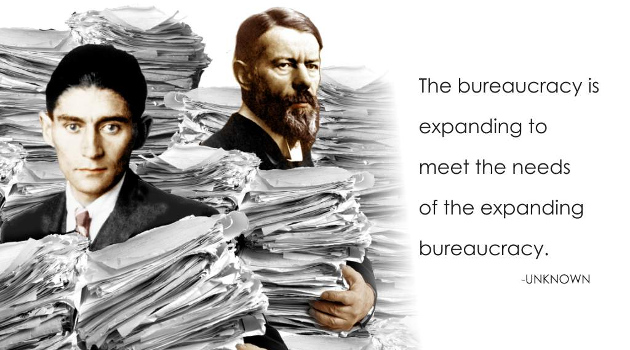I have a “Bureaucrat Hall of Fame” to acknowledge individuals who go above and beyond the call of duty. As measured by sloth and waste, of course.
But maybe I also need a “Bureaucracy Hall of Fame” for examples that capture the self-serving nature of departments, bureaus and agencies. I already have several examples.
- In 2014, I wrote we learned “everything you need to know about government bureaucracy” when discussing how senior bureaucrats at the Veterans Administration got big bonuses while they were putting veterans on secret waiting lists.
 The following year, I wrote that we learned “everything you ever wanted to know about bureaucracy and government” when discussing how governments have dramatically increased the number of firefighters even though there are now far fewer fires.
The following year, I wrote that we learned “everything you ever wanted to know about bureaucracy and government” when discussing how governments have dramatically increased the number of firefighters even though there are now far fewer fires.- In 2016, I wrote about “the Italian version of everything you need to know about bureaucracy and government” when discussing rampant absenteeism, featherbedding, and fraud by local bureaucrats in a town in southern Italy.
Let’s augment this collection by taking a virtual trip to the Pacific Ocean.
The Economist has a sobering report about how many people in Indonesia aspire to become overpaid bureaucrats.
When the government rang to tell Budi (not his real name) that he had been hired as a tax collector, it was like a dream come true. When he graduated from university in 2013, the only work he could find was as a stevedore at the local port. Jobs in his hometown of Ende,
a small city on the island of Flores, were scarce. Local government promised a steady income and a pension. …Budi was one of the lucky ones. Last year some 4.2m people applied for around 150,000 spots in the civil service. …Government salaries are often higher than those at private companies, and jobs are for life. …senior bureaucrats, particularly in the farther reaches of the archipelago, regard the districts in which they serve as their own personal fiefs.
Sadly (but predictably), they don’t repay the coerced generosity of taxpayers by providing quality governance.
…they often fail to serve the people. Public services are patchy, particularly at the level of local government, which is responsible for health care and education, among other things. Real spending per person by local governments soared between 1994 and 2017, by 258% on average, according to the World Bank.
But services remain ropy. More than half of children leave school unable to read properly, for instance. Inefficiency is rife. At the local level, exam results, jobs, promotions and transfers are regularly sold to the highest bidders, according to a study published in 2012… Local politicians often reward supporters with temporary posts in the civil service. …A report published in 2017 by the State Civil Service Agency found that more than 40% of the 696 directors (the highest-ranking bureaucrats) that it assessed were not fit to do their jobs.
Want more evidence?
This column from 2017 is painful evidence that more money for bureaucracy in Indonesia doesn’t translate into better results.
Unsurprisingly, it’s almost impossible to fire bureaucrats in Indonesia, notwithstanding their penchant for graft and corruption.
…it is almost impossible to fire civil servants. In 2017 only 347 out of 4.3m were dismissed. …Workers often slink away from their desks hours before they are supposed to. …Many civil servants also seek to bump up their incomes through schemes… Employees of the tourism ministry, for instance, are paid a generous daily fee when they travel for work. It is standard practice to extend trips by a day or two beyond what is necessary, to claim extra cash, says Hadiono. Some officials are not content to stop there. Every year, millions of dollars are siphoned off the health system which, with its relatively large budget, is a particularly popular target for embezzlers.
The most amusing (or most tragic) part of the story is that Indonesia actually set up a bureaucracy that’s in charge or reforming bureaucracy.
…there have been many attempts to reform the bureaucracy; an entire ministry is devoted to the cause.
Needless to say, that won’t produce good results.
Since I realize there may not be many readers who have a keen interest in policy developments in Indonesia, allow me to close with two observations that have very wide application (in addition to the above point about bureaucracies behaving in a self-interested fashion).
- First, poor countries won’t become rich countries if they don’t follow the recipe for growth and prosperity. At the risk of understatement, excessive bureaucracy is not one of the ingredients.
 Bureaucratic bloat is a problem throughout the developing world, not just Indonesia.
Bureaucratic bloat is a problem throughout the developing world, not just Indonesia. - Second, it’s a very bad sign for any nation’s outlook if ambitious people think becoming a bureaucrat is the ticket for economic success. That’s either evidence of excessive pay for people in government or evidence of a private sector stifled by too much government. Or both.
Remember, this satirical video actually does a very good job of capturing how bureaucracy actually operates.
P.S. If you want to enjoy additional bureaucrat humor, my collection includes a joke about an Indian training for a government job, a slide show on how bureaucracies operate, a cartoon strip on bureaucratic incentives, a story on what would happen if Noah tried to build an Ark today, a top-10 list of ways to tell if you work for the government, a new element discovered inside the bureaucracy, and a letter to the bureaucracy from someone renewing a passport.
P.P.S. If you want unintentional humor, the OECD actually asserted that the problem in Indonesia is that government is too small.

